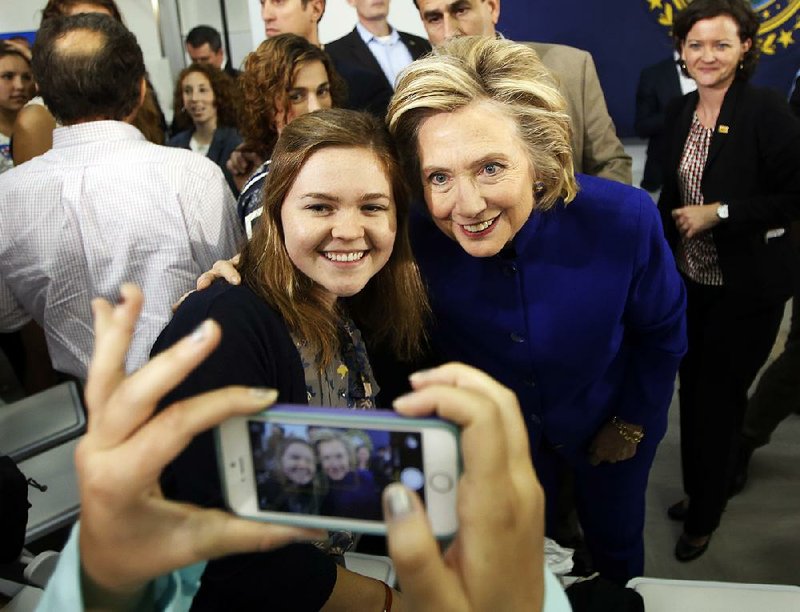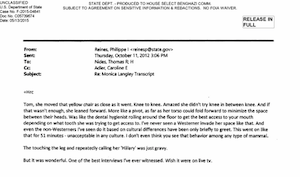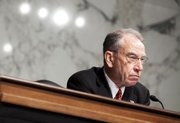WASHINGTON -- Hillary Rodham Clinton's attorney is providing the FBI with the private server that housed her email during her four years as secretary of state, Clinton's presidential campaign said Tuesday.
Meanwhile, it was disclosed that several of Clinton's former top aides have been drawn into a federal inquiry and that two emails on her private account have been classified as "top secret."
Clinton's lawyer David Kendall also gave three thumb drives containing copies of roughly 30,000 emails to the FBI after the agency determined that he could not remain in possession of the classified information contained in some of the messages, according to a U.S. official briefed on the matter who was not authorized to speak publicly.
The State Department previously had said it was comfortable with Kendall keeping the emails at his Washington law office.
The FBI has been looking into the security of Clinton's private server.
Nick Merrill, a Clinton spokesman, said Tuesday night that Clinton is cooperating with the investigation. He declined to say whether the FBI ordered that she turn over the thumb drives or when they were turned over.
"She directed her team to give her email server that was used during her tenure as secretary to the Department of Justice, as well as a thumb drive containing copies of her emails already provided to the State Department," Merrill said. "She pledged to cooperate with the government's security inquiry, and if there are more questions, we will continue to address them."
The inquiry by the FBI is considered preliminary at this point and appears to be focused on ensuring the proper handling of classified material.
The agency's efforts included contacting the Denver-based technology firm that helped manage her email system.
Clinton has resisted relinquishing control of the server. In March, she said the server contained "personal communications from my husband and me."
"I believe I have met all of my responsibilities, and the server will remain private," she said then, in response to a question from a reporter about whether she would allow an independent party to examine the device.
Also that month, Kendall told a congressional oversight committee in an email that there was "no basis" to support a third-party examination of the server. He indicated that he had confirmed with information-technology workers that no email sent or received by Clinton's account while she was secretary of state remained on the server or backup systems associated with the system.
Word that Clinton had relented on giving up possession of the server came as Republican Sen. Chuck Grassley of Iowa said two emails that traversed Clinton's personal system were deemed "Top Secret, Sensitive Compartmented Information" -- a rating that is among the government's highest classifications.
Grassley said the inspector general of the nation's intelligence community, I. Charles McCullough III, had reported the new details about the higher classification to Congress on Tuesday.
Those two emails were among four that had previously been determined by the inspector general of the intelligence community to have been classified at the time they were sent.
Much of the classified information in the email conversations originated with the CIA, according to two government officials familiar with the records. Some of the information was deemed to be classified by the National Geospatial Intelligence Agency's classification guidelines.
The information included references to information related to satellite images and electronic communications, according to the officials.
A State Department spokesman late Tuesday described the top-secret designation as a recommendation and said they had not been marked classified at the time but that workers "circulated these emails on unclassified systems in 2009 and 2011 and ultimately some were forwarded to Secretary Clinton."
McCullough's findings stemmed from his office's review of a sample of 40 of Clinton's emails. McCullough has asked for access to all of the emails to conduct a more thorough review but was denied by State Department officials in July.
Late Tuesday, State Department spokesman John Kirby said that while the agency was working to "resolve whether, in fact, this material is actually classified, we are taking steps to ensure the information is protected and stored appropriately."
Earlier this year, Clinton turned over to the State Department about 55,000 pages of emails she sent and received via her private email server. The department is reviewing those emails and has begun the process of releasing them to the public.
"As she has said, it is her hope that State and the other agencies involved in the review process will sort out as quickly as possible which emails are appropriate to release to the public, and that the release will be as timely and transparent as possible," Merrill said Tuesday.
Clinton has also said she destroyed thousands of others emails that were not work-related.
The inspector general for the intelligence community had told Congress that potentially hundreds of classified emails are among the cache that Clinton provided to the State Department.
Four top aides
The notice came as the State Department inspector general's office acknowledged that it is reviewing the use of "personal communications hardware and software" by Clinton's former top aides after requests from Congress.
"We will follow the facts wherever they lead, to include former aides and associates, as appropriate," said Douglas Welty, a spokesman for the State Department's inspector general.
Grassley, the chairman of the Senate Judiciary Committee, said he wants Clinton and her aides to "come clean and cough up" information about their email use.
"Both the State Department and intelligence community inspectors general should be looking into the staff use of the Clinton private server for official State Department business. This means giving both inspectors general access and custody of all emails that haven't already been deleted," he said.
At least four top aides have turned over records, including copies of work emails on personal accounts, to the State Department, which is collecting them in response to a subpoena from Congress, according to the department.
Lawmakers have demanded records, including personal emails, from six other aides, but it's unknown whether they used personal email for work.
Government officials and Clinton aides have declined to provide a full list of which aides used personal email for government business or who might have had an email account on Clinton's personal server.
Clinton acknowledged in a sworn affidavit filed Monday that Huma Abedin, her deputy chief of staff and one of her closest confidants, had an account on her personal server. She submitted the affidavit as part of a lawsuit by the conservative group Judicial Watch, which is seeking State Department records.
Clinton's affidavit was her first disclosure that any of her former aides used personal accounts or accounts on her personal server to conduct business. Clinton said her chief of staff, Cheryl Mills, did not have an account on the server.
Mills; Jake Sullivan, also a deputy chief of staff; and Deputy Assistant Secretary of State Philippe Reines have turned over records to the State Department, including personal emails, in response to a subpoena by the House committee investigating the fatal attacks in Benghazi, Libya, in 2012, according to the State Department.
Mills had planned to delete her emails after submitting them to the State Department, according to an Aug. 6 letter from her attorney to the State Department that was submitted as evidence in the lawsuits. Her attorneys planned to keep a copy of the emails.
But U.S. District Judge Emmet Sullivan, who is presiding over the lawsuit, issued an order Friday instructing the State Department to direct Clinton, Mills and Abedin not to destroy any records.
Reines and Jake Sullivan did not respond to messages this week, nor did attorneys for Mills and Abedin.
Information for this article was contributed by Carol D. Leonnig, Tom Hamburger and Rosalind S. Helderman of The Washington Post; by Ken Dilanian of The Associated Press; and by Anita Kumar, Marisa Taylor and Greg Gordon of Tribune News Service.
A Section on 08/12/2015




